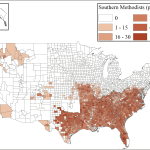In RetroPost, we feature a post from at least one year ago (ancient in pop culture time). The posts are featured because they have some relevance to current happenings, because they are timeless in nature and speak to a relevant issue, or because we plan on providing a follow-up in an upcoming post.
This Week: Some holidays provided renewed opportunity for debate every time that time of the year rolls around. Halloween, July 4th, and Christmas all provide ample opportunity for lively debate among Christians who are rightfully thinking through our common cultural practices. This week, we are reprinting two posts that were published last year and ended up being just as timely this year. Because, well, that’s how holidays work.
He is the all-seeing, all-knowing, omnipresent being, who rewards the good and punishes the bad. He is mysterious and beyond our comprehension. He is both transcendent and immanent, and we feel His presence in special ways around this time of year. Wait…I’ve lost myself in my own introduction. Are we talking about God or Santa?
The two seem not so dissimilar if you pause and reflect for a moment. And for the most part Christians don’t often pause and reflect on this Santa figure. Is his similarity to the Almighty an acceptable myth or does it have implications for Christian theology and life?
I am no Santa hater. I was welcomed to believe in him as a child, and did for several years. My family enjoyed the fantasy of the happy “old-elf” who ate our cookies while we slept and left us presents. And for my part I never struggled, as a youth, to believe in God.
I can’t help but wonder, however, if there are those out there for whom God, as they grow older, becomes nothing more than a fictitious figure to be placed in the story-book next to “Jolly Old Saint Nicholas.” One surely can’t blame Santa Clause for an individual’s “fall from faith,” and I don’t intend to here. But he can be part of the larger problem of continually weakening view of the Divine. God, in the mind of the popular culture, is a lot like Santa Clause (think of “God, the Kindly Grandfather”).
Santa Clause is the sweet old man of myth and legend. He is a benevolent gift-giver and imbued with great magic. Of course there are a myriad of different interpretations of the Santa character, but in the mid-19th century America settled on the jolly old elf from the North Pole with a red suit and belly full of jelly. Every year on Christmas Eve this man flies a magical sleigh, pulled by magical reindeer, around the world, slips into your house while you sleep and puts presents under the tree.
What’s interesting to me is the commonly associated attributes of Father Christmas. He knows all, can do the unimaginable, and to a certain degree he is a judge. These characteristics raise in my mind an important question to consider as the holiday season is now upon us: is Santa simply the culture’s attempt to make a more palatable God? And if so how should Christians respond? Does this confuse children? Does it contaminate theology? I am inclined to say that while it doesn’t necessarily contaminate our theology, it does perpetuate an already faulty doctrine of God in American and Western society.
The two men are in reality quite distinct. Santa is the grandfatherly kind old man who, if you’re good, gives you candy from his pocket. God, on the other hand, is the holy divine creator. He is the sovereign one who has every right to make demands on your life and hold you accountable for not fulfilling the purpose for which He created you: to glorify Him. These two distinct men pose two distinct worldviews. (1) The first says God was created for me; (2) the second says, I was created for God!
So what are we to do with Santa Clause as this holiday season approaches? That is a question for individual believers to carefully consider. The important thing is to be sure that we aren’t confusing God and Santa, and more importantly that the realization that one is a myth doesn’t lead to a conclusion that the other is also fiction, something for little kids but not those of a mature mind. Whatever you decide about Saint Nick do your best to teach your children that no matter how old they get they never grow out of believing in God.















